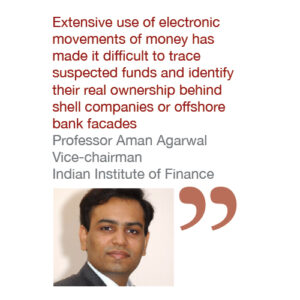Widely welcomed measures to tackle the clandestine transfer of funds have been undermined by infighting over the allocation of adjudicating powers
Raghavendra Verma reports from New Delhi
In January 2007 a raid on Pune-based businessman Hassan Ali Khan’s premises allegedly uncovered US$8 billion hidden in Swiss bank accounts. Government agencies claimed he had transferred US$300 million from one of his accounts to a Saudi arms dealer.
The case gained further prominence when Swiss bank UBS turned down India’s request to divulge the details of the account, ostensibly because it hadn’t received proper judicial documentation from Indian authorities. In retaliation earlier this year, as reported in the Hindustan Times, India obstructed UBS’s US$118 million deal to buy Standard Chartered Bank’s mutual fund business in the country.
A growing problem
High profile cases such as this, combined with India’s increasing involvement in complex international financial transactions, have brought the issue of money laundering to the forefront of the political agenda. Criminal activity associated with “dirty money” has been the primary concern, particularly where foreign remittances through wire transfers are used as a means of funding.
Additional challenges have been posed by the spread of terrorist networks and the illegal trading of arms and drugs, all of which are activities that thrive on the clandestine transfer of funds.
According to Professor Aman Agarwal, vice-chairman of the Indian Institute of Finance in New Delhi, the “extensive use of electronic movements of money has made it difficult to trace suspected funds and identify their real ownership behind shell companies or offshore bank facades”.
Tax heavens like Cyprus and Mauritius, which have minimal restrictions on financial transactions and the operations of foreign businesses, are seen as ideal centres for channelling and holding money laundering funds, Agarwal adds.
Sarabjeet Singh, a chartered accountant heading the anti-money laundering division of New Delhi-based BMR Advisors, says that banks’ internal assessments give India a high-risk rating for the potential for money laundering. This is a result, he says, of inadequate regulatory provisions, a poor track record of implementing laws and delays in the justice delivery system. India’s cross-border financial transactions thus require extra due diligence, often leading to delays in their processing.
Fighting back
Eager to clean up its act, India is now implementing anti-money laundering regulations in line with those prescribed by the Financial Action Task Force (FATF), a 34-member inter-governmental body on which India holds observer status. “Being an emerging economy and heading towards fast-paced integration with global financial systems, India is getting its regulations in line with other FATF countries,” Singh explains.
The FATF aims to develop and promote policies and measures to counter the use of the financial system by criminals. Its recommendations are frequently revised to ensure that they remain up to date and relevant to the evolving threat of money laundering.
India has also demonstrated its commitment to tackling money laundering with the implementation of the Prevention of Money Laundering Act (PMLA), 2002, and the establishment of the Financial Intelligence Unit (FIU) to counter suspicious cash transactions.
Criminal activities defined by the PMLA include offences under the Indian Penal Code such as murder, kidnapping and the counterfeiting of currency notes in addition to illegal trading in drugs, arms and wildlife, prostitution, the bribery of public servants and terrorism-related crimes. A new amendment to this list will include child labour, human trafficking, piracy and crimes relating to insider trading and the manipulation of stock markets.
Further amendments have been proposed to include offences committed in other countries, even if the offences are not constituted as criminal in those jurisdictions. The amendments were recently finalized bringing not only international credit card transactions and money transfers under the purview of the PMLA, but also a new category of offences with cross-border implications.
























